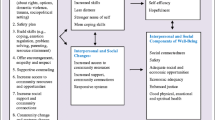Abstract
In the U.S., communities often rely on the criminal justice system to respond to, house, and treat individuals with mental health and substance use problems. This has resulted in a crisis response system that relies on police officers to respond to mental and behavioral health crisis due to a lack of options. Unfortunately, these encounters can be dangerous for individuals in need of help. Additionally, this has led to a disproportionate number of individuals with mental illness and substance use disorders being housed in prisons. Alternatives to our current crisis response system already exist in the form of community-based mobile crisis response teams that rely on mental health workers instead of law enforcement. This review examines such programs that have been enacted in multiple cities across the country. Analysis of these alternative crisis response models shows that community-based programs are more effective, efficient, and safer than the current standard that relies on law enforcement. This analysis highlights the need for the establishment of community-based crisis response teams as the national standard.
Similar content being viewed by others
References
Health NIoM. Mental Illness. U.S. Department of Health and Human Services (2022). https://www.nimh.nih.gov/health/statistics/mental-illness. Accessed July 3 2022.
Health NCfCaI (Accessed July 20 2022). Symptons Matter - Leading Causes of Disability. U.S. Department of Health and Human Services. https://www.nccih.nih.gov/about/symptoms-matterleading-causes-of-disability.
Ross, S., & Peselow, E. (2012). Co-occurring psychotic and addictive disorders: Neurobiology and diagnosis. Clinical Neuropharmacology, 35(5), 235–243. https://doi.org/10.1097/WNF.0b013e318261e193.
Livingston, J. D. (2016). Contact between police and people with Mental disorders: A review of Rates. Psychiatric Services (Washington, D. C.), 67(8), 850–857. https://doi.org/10.1176/appi.ps.201500312.
Magee, L. A., Fortenberry, J. D., Rosenman, M., Aalsma, M. C., Gharbi, S., & Wiehe, S. E. (2021). Two-year prevalence rates of mental health and substance use disorder diagnoses among repeat arrestees. Health Justice, 9(1), 2. https://doi.org/10.1186/s40352-020-00126-2.
Lowery, W. K. K., Alexander, K. L., Tate, J., Kenkins, J., & Rick, S. (2015). Distraught People, Deadly Results.
Laniyonu, A., & Goff, P. A. (2021). Measuring disparities in police use of force and injury among persons with serious mental Illness. Bmc Psychiatry, 21(1), 500. https://doi.org/10.1186/s12888-021-03510-w.
Edwards, F., Lee, H., & Esposito, M. (2019). Risk of being killed by police use of force in the United States by age, race-ethnicity, and sex. Proc Natl Acad Sci U S A, 116(34), 16793–16798. https://doi.org/10.1073/pnas.1821204116.
Prins, S. J. (2014). Prevalence of mental illnesses in US State prisons: A systematic review. Psychiatric Services (Washington, D. C.), 65(7), 862–872. https://doi.org/10.1176/appi.ps.201300166.
Maruschak, L. M., & BJ, Alper, M. (2021). Indicators of Mental Health problems reported by prisoners: Survey of prison inmates, 2016. editor.: Bureau of Justice Statistics. Justice USDo.
Baillargeon, J., Penn, J. V., Knight, K., Harzke, A. J., Baillargeon, G., & Becker, E. A. (2010). Risk of reincarceration among prisoners with co-occurring severe mental Illness and substance use disorders. Administration and Policy in Mental Health, 37(4), 367–374. https://doi.org/10.1007/s10488-009-0252-9.
Schnittker, J., Massoglia, M., & Uggen, C. (2012). Out and down: Incarceration and psychiatric disorders. Journal of Health and Social Behavior, 53(4), 448–464. https://doi.org/10.1177/0022146512453928.
Morgan, E. R., Rivara, F. P., Ta, M., Grossman, D. C., Jones, K., & Rowhani-Rahbar, A. (2022). Incarceration and subsequent risk of Suicide: A statewide cohort study. Suicide and Lifethreatening Behavior, 52(3), 467–477. https://doi.org/10.1111/sltb.12834.
Engel, R. S., McManus, H. D., & Herold, T. D. (2020). Does de-escalation training work? Criminology & Public Policy, 19(3), 721–759. https://doi.org/10.1111/1745-9133.12467.
Watson, A. C., Pope, L. G., & Compton, M. T. (2021). Police Reform from the Perspective of Mental Health Services and professionals: Our role in Social Change. Psychiatric Services (Washington, D. C.), 72(9), 1085–1087. https://doi.org/10.1176/appi.ps.202000572.
Rafla-Yuan, E., Chhabra, D. K., & Mensah, M. O. (2021). Decoupling Crisis Response from Policing - A Step toward Equitable Psychiatric Emergency Services. New England Journal of Medicine, 384(18), 1769–1773. https://doi.org/10.1056/NEJMms2035710.
Beck, J. R. M., & Pope, L. (2020). Shifting from Police to Community Responses. In: Behavioral Health Crisis Alternatives. Vera Institute of Justice. https://www.vera.org/behavioral-health-crisis-alternatives. Accessed July 3 2022.
Beck, J. R. M., Pope, L., & Case Study (2020). : CAHOOTS. In: Behavioral Health Crisis Alternatives. Vera Institute of Justice. https://www.vera.org/behavioral-health-crisis-alternatives/cahoots. Accessed July 22 2022.
Waters, R. (2021). Enlisting Mental Health Workers, not cops, in Mobile Crisis Response. Health Aff (Millwood), 40(6), 864–869. https://doi.org/10.1377/hlthaff.2021.00678.
Blais, E., & Brisebois, D. (2021). Improving police responses to suicide-related emergencies: New evidence on the effectiveness of co-response police-mental health programs. Suicide and Lifethreatening Behavior, 51(6), 1095–1105. https://doi.org/10.1111/sltb.12792.
Shapiro, G. K., Cusi, A., Kirst, M., O’Campo, P., Nakhost, A., & Stergiopoulos, V. (2015). Co-responding Police-Mental Health Programs: A review. Administration and Policy in Mental Health, 42(5), 606–620. https://doi.org/10.1007/s10488-014-0594-9.
Murphy, S. M., Irving, C. B., Adams, C. E., & Waqar, M. (2015). Crisis intervention for people with severe mental illnesses. Cochrane Database Systematic Review, (12), CD001087. https://doi.org/10.1002/14651858.CD001087.pub5.
Khalsa, H. K., Denes, A. C., D MP-H, Santelli, J. C., & Baldessarini, R. J. (2018). Specialized Police-based Mental Health Crisis response: The First 10 years of Colorado’s Crisis intervention team implementation. Psychiatric Services (Washington, D. C.), 69(2), 239–241. https://doi.org/10.1176/appi.ps.201700055.
Rogers, M. S., McNiel, D. E., & Binder, R. L. (2019). Effectiveness of Police Crisis intervention Training Programs. The Journal of the American Academy of Psychiatry and the Law, 47(4), 414–421. https://doi.org/10.29158/JAAPL.003863-19.
Funding
This study was self-funded by the authors.
Author information
Authors and Affiliations
Corresponding author
Ethics declarations
Competing interests
No conflicts of interest to disclose.
Additional information
Publisher’s Note
Springer Nature remains neutral with regard to jurisdictional claims in published maps and institutional affiliations.
Rights and permissions
Springer Nature or its licensor (e.g. a society or other partner) holds exclusive rights to this article under a publishing agreement with the author(s) or other rightsholder(s); author self-archiving of the accepted manuscript version of this article is solely governed by the terms of such publishing agreement and applicable law.
About this article
Cite this article
Gonzalez Miranda, L.A., Shetty, A. & Ehlke, D. Analyzing Alternative Behavioral Crisis Response Models in the U.S.. J Community Health 49, 324–329 (2024). https://doi.org/10.1007/s10900-023-01299-1
Accepted:
Published:
Issue Date:
DOI: https://doi.org/10.1007/s10900-023-01299-1




